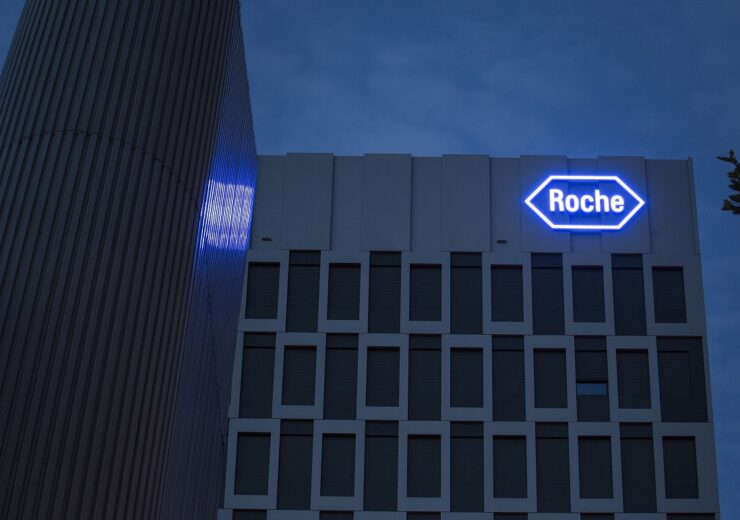The FDA approval is based on the Phase 3 IMpower010 study, which showed that adjuvant Tecentriq improved disease-free survival by more than one-third

Roche Logo on building night shot. (Credit: F. Hoffmann-La Roche Ltd.)
Roche has secured the US Food and Drug Administration (FDA) approval for its Tecentriq (atezolizumab) to treat a type of non-small cell lung cancer (NSCLC).
The US regulator indicated the drug as an adjuvant treatment for Stage II-IIIA NSCLC in adults with PD-L1≥1%, following surgery and platinum-based chemotherapy.
Its approval was based on results from an interim analysis of the Phase 3 IMpower010 study, and the application was reviewed under its Project Orbis initiative.
Results from the Phase 3 IMpower010 trial showed that treatment using Tecentriq reduced the risk of disease recurrence or death by 34%, compared with best supportive care (BSC).
In the study, the drug showed safety data that is consistent with its known safety profile, with no new safety signals identified.
Tecentriq is a monoclonal antibody designed to block the Programmed Death Ligand-1 (PD-L1) protein, expressed on tumour cells and tumour-infiltrating immune cells.
The drug is currently approved in the US, EU and countries worldwide, as a standalone therapy or in combination with targeted therapies to treat several cancer types.
Roche chief medical officer and global product development head Levi Garraway said: “Tecentriq is now the first and only cancer immunotherapy available for adjuvant treatment of NSCLC, introducing a new era where people diagnosed with early lung cancer may have the opportunity to receive immunotherapy to increase their chances for cure.
“Today’s landmark approval gives physicians and patients a new way to treat early lung cancer that has the potential to significantly reduce risk of cancer recurrence, after more than a decade with limited treatment advances in this setting.”
In a separate development, the Swiss drugmaker has partnered with PathAI, a company developing artificial intelligence (AI)-powered technology for pathology.
Under the partnership, the companies will jointly develop and distribute PathAI’s AI-powered technology through Roche’s uPath enterprise software.
The collaboration aims to develop an embedded image analysis workflow, which allows pathologists to access PathAI image analysis algorithms within Roche’s uPath enterprise software NAVIFY Digital Pathology.
Roche will initially distribute PathAI’s research-use-only (RUO) algorithms through NAVIFY Digital Pathology, across different cancer types.
The agreement marks the first for Roche to expand digital tools through an open environment, and for PathAI to distribute its AI-powered solutions through a third-party platform.
PathAI CEO Andy Beck said: “This collaboration brings together all of the components required to deliver and commercialise a differentiated AI-based digital pathology medical device including assay, scanner, image management system and algorithm.
“We believe this partnership will unlock the potential for digital pathology in the companion diagnostics setting, offering a differentiated service to biopharma sponsors and ultimately new opportunities to improve patient outcomes.”
